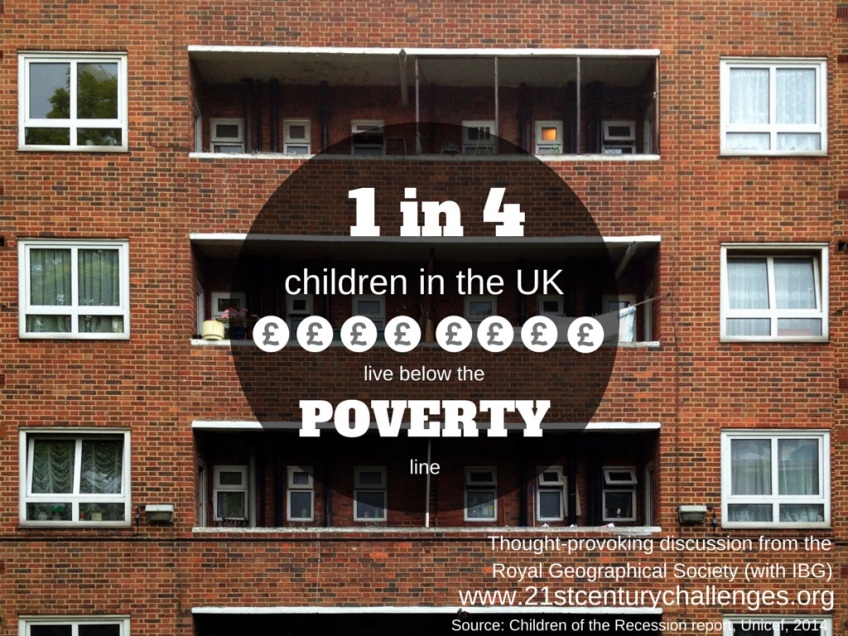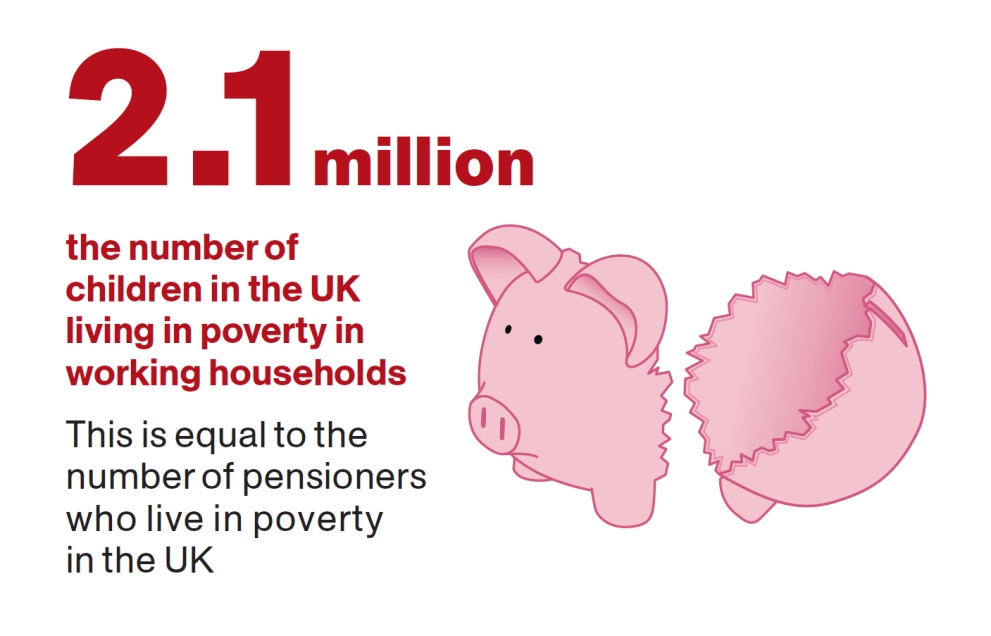Poverty in Britain

What’s the challenge?
Britain is the world’s fifth richest country, yet poverty in Britain is rising. With paid work failing to reduce poverty for many, how can Britain best tackle this growing issue?
Poverty is “people whose resources are so seriously below those commanded by the average individual or family that they are, in effect, excluded from ordinary living patterns, customs and activities.”
Source: Townsend Centre for International Poverty Research
Facts
- 2.1 million: The number of children in Britain currently living in poverty in working households, where at least one adult is working.
- 60%: The percentage of poor adults who live in working households in Britain
- 10.9 million: people identified as ‘poor’ in Britain in 2008/9 based on their household income before housing costs.
- London is one of the most unequal places in the UK
- 2.2 million: The number of pensioners who currently live in poverty in Britain
- Britain has a higher proportion of its population living in relative poverty than most other EU countries
Sources: Joseph Rowntree Foundation, 2010, IPPR, 2010, Oxfam
Low-income households
A household is deemed to be ‘in poverty’ if its income is less than 60% of median household income. The value of this poverty line depends on the number of people in the household (reflecting larger households need more money). In 2008/9 this was worth, per week:
£119 for a single adult
£161 for a lone parent
£206 for a couple with no children
£288 for a couple with two children under 14
In-work poverty
In-work poverty occurs when working families do not have an income that is high enough to lift them over the poverty line. During 2000s there was a greater number of people experiencing working poverty than workless poverty.
Read more about tackling poverty
Panel discussion
The Royal Geographical Society (with IBG) held a panel discussion on 15 March 2011 to discuss the issue.
Frank Field, MP Member of Parliament for Birkenhead
Frank Field was appointed Chairman of the Independent Review on Poverty and life chances in June 2010. From 1969-79, Frank Field worked as Director of the Child Poverty Action Group, during which time it became one of the premier pressure groups in the country.
In 1974 he also became Director of the Low Pay Unit until 1980. The Unit was established to make sure wages councils properly protected the rights of workers in certain industries. It was the first to campaign for a national minimum wage, along with Rodney Bickerstaffe, the former general secretary of the National Union of Public Employees, now Unison; a goal that was eventually achieved in 1998.
John Bird MBE, Founder and Editor-in Chief, The Big Issue
“An inspirational business leader with an outstanding record of using business as a tool for social change, John Bird is an original and authoritative voice on a range of social and business issues”.
Julian Richer, Entrepreneur and Author.
John Bird was born into poverty, brought up in care, and has lived through a lot. His life’s journey has included spells as a thief, prison inmate, artist and poet. Now an established iconoclast, activist and publisher, John Bird is the force behind The Big Issue, the world’s most successful street magazine. He is an inspirational business leader with an outstanding record of using business as a tool for social change.
At a time when Corporate Social Responsibility is preoccupying business leaders and consumers alike, John Bird offers an authoritative, fresh approach, and some original perspectives on the interaction of business and society. His diverse experience, combined with his exuberant personality, erudition and often trenchant views make him a compelling and entertaining speaker.
John has spoken at the UN in New York, Nairobi and Istanbul, Downing Street and Buckingham Palace. The UN Scroll of Honour, an MBE and the 2005/6 Beacon Prize for Creative Giving are just three of the many accolades and awards he has received. Since founding The Big Issue in 1991 with Gordon Roddick, John has overseen its development into the UK’s most successful social enterprise, stretching from Tokyo to Totnes and helping thousands of homeless people worldwide.
His autobiography “Some Luck”, published by Penguin is a compelling story of John’s journey from poverty, rejection, and struggle to eventual redemption. In March 2007 he took part to the Quick Reads campaign and wrote the bestselling ‘How to change your life in 7 steps’ (Random House).
”I think we’ve got poverty wrong. We spend too much time and too much money on the poor and what we do is enslave them. We don’t give them the opportunity, we postpone the day they will have social mobility. They are of another species.” John Bird MBE
”I used to be a part of the problem and then became a part of the solution.” John Bird MBE
Julia Unwin CBE, Chief Executive, Joseph Rowntree Foundation
Julia Unwin is Chief Executive of the Joseph Rowntree Foundation and the Joseph Rowntree Housing Trust.
She was a member of the Housing Corporation Board for 10 years and a Charity Commissioner from 1998-2003. Julia was also Deputy Chair of the Food Standards Agency and worked as an independent consultant operating within government and the voluntary and corporate sectors. In that role, she focused on the development of services and in particular the governance and funding of voluntary organisations. Julia has researched and written extensively on the role, governance and funding of the voluntary sector.
She previously held a position as chair of the Refugee Council from 1995 until 1998, and is now a trustee of York Museums and Gallery Trust and a member of the University of York’s Council.

Interviews
Kate Wareing, Director of Poverty programme, Oxfam UK
Oxfam’s vision is that diverse communities of women and men living in poverty will exercise their rights to a decent and secure standard of living in a rich industrialised society.
Kate Wareing is the Director of Oxfam’s UK Poverty Programme. Programme, which works with partners to tackle poverty and inequality in Scotland, England and Wales.
Oxfam works to overcome poverty in the UK in three ways. It develops projects with people living in poverty to improve their lives and show how things can change, raises public awareness of poverty to create pressure for change, and works with policymakers to tackle the causes of poverty. The focus of Oxfam’s work in the UK is on ensuring that everyone in the UK has a secure income which gives them enough money to live on. Oxfam also tackles the discrimination which makes women, ethnic minority groups and others more vulnerable to poverty. In 2009/10 Oxfam’s worked directly with around 8,000 people living in poverty in the UK: its policy and advocacy work has affected the lives of hundreds of thousands more.
Further Reading
Joblessness, poverty & welfare in the UK, Geography Directions, 2010
Moving towards a living wage in the UK, Geography Directions, October 2014


Pingback: Top Best Brexit—The Beginning of Conscious Revolution?